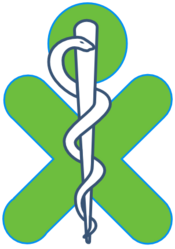Telemedicine: Difference between revisions
No edit summary |
m (→Rs 15,000 Kit) |
||
| (3 intermediate revisions by 3 users not shown) | |||
| Line 1: | Line 1: | ||
{{ |
{{Health}} |
||
==Telemedicine on BBC== |
==Telemedicine on BBC== |
||
| Line 88: | Line 88: | ||
Ponnapa |
Ponnapa |
||
---- |
|||
15000 INR = ±217 € (Euro). |
|||
(INR = Indian Rupee) |
|||
==Diagnostic kit== |
|||
Neurosynaptic have successfully built a remote low cost diagnostic kit called ReMeDi that can measure temperature, blood pressure, ECG and heartbeat (stethoscope) and perform other tasks. It won a prize at the [http://www.weforum.org/ World Economic Forum] 2007. There was an [http://images.businessweek.com/ss/07/11/1129_tech_pioneers/source/22.htm article in businessweek] |
|||
[http://www.neurosynaptic.com/ Neurosynaptic Communications] |
|||
Bangalore, India |
|||
Sector: Health Care |
|||
Sameer Sawarkar, CEO |
|||
Age: 35 |
|||
Bangalore's Neurosynaptic Communcations is making health care for India's villages accessible and affordable. The company has a $255 portable diagnostic kit that performs five basic health tests, including blood pressure, temperature, and even an electrocardiogram. Used by the village paramedic, results are transmitted back to the closest hospital through any of the multimedia kiosks mushrooming across rural India. The cost to the patient: a rock bottom 63 cents per test. The pioneer of this telemedicine for the masses is [http://www.linkedin.com/pub/2/554/223 Sameer Sawarkar], a former sensor expert at Motorola, who was motivated by the hardships of getting health-care during his childhood in a village. |
|||
[[Category:Feedback]] |
[[Category:Feedback]] |
||
Latest revision as of 20:12, 22 March 2009
Telemedicine on BBC
Telemedicine lifeline for villages
Rural doctors in one of the world's poorest countries are going to be offered online medical centres in an attempt to help them provide better care for the sick.
A private company called Bangladesh Telemedicine Services (BTS) has come up with an ambitious project to set up telemedicine centres to help doctors identify diseases early on.
Please look at TeleHealth Module and Telehealth module database for some of the work currently being done by OLPC Volunteers
Telemedicine center
[ict_of_bangladesh] Telemedicine centre launched From: "Moderator: ICT of Bangladesh Yahoo Group" <ict_of_bangladesh@yahoo.com> To: ict_of_bangladesh@yahoogroups.com FARIDPUR, Aug 11: A telemedicine centre, first of its kind in Bangladesh, was launched here today to provide distance medical treatment to patients, reports UNB. Professor Dr Mohammad Yunus, a noted economist and MD of Grameen Bank and chairman of Grameen Telecom, inaugurated the centre set up at Faridpur Diabetic Hospital. With the launch of the centre, a patient from the area can contact any specialist physician in Dhaka describing his health problems and collect prescription through the information superhighway by means of Internet. Speaking on the occasion, Dr Yunus said local patients, particularly poor ones, would be benefited much as they would be able to contact physicians in the capital through the centre. "Any patient can also take medical suggestion from any foreign specialist physician soon," he told the function. Presided over by Professor MA Samad, the function was also addressed by Deputy Commissioner Mohammad Nasir Uddin Khan and Civil Surgeon Dr SM Abul Khair Mia. On the opening day, Basu Dev, 65, a resident of Muksudpur upazila in Gopalganj district, who has been suffering intestinal diseases along with diabetics, took prescription directly talking with noted gastric and liver-disease specialist Professor Dr AK Azad Khan in the capital. The telemedicine centre has been set up under the initiative of the Diabetic Association of Bangladesh, Grameen Telecom, GrameenPhone, Diabetic Association of Faridpur and noted specialist physicians in Dhaka. Any local patient can take prescription from specialist physicians in the capital through the centre by paying Tk 600 as fee.
Rs 15,000 Kit
Fwd: Rural Tele- medical kit * To: debian-med@lists.debian.org * Subject: Fwd: Rural Tele- medical kit * From: Edward Cherlin <edward.cherlin@etssg.com> * Date: Fri, 17 Jun 2005 16:12:41 -0700 * Message-id: <200506171612.41898.edward.cherlin@etssg.com> * Old-return-path: <edward.cherlin@etssg.com> * Organization: Encore Technologies * User-agent: KMail/1.7.2 From: "Bob Pyke Jr." <repyke@infionline.net> To: "Telehealth-L" <TELEHEALTH@maelstrom.stjohns.edu> CC: TELEMEDICINE@jiscmail.ac.uk From another list and blog I am on Rural Tele- medical kit On Thursday 12 May 2005 19:47, Ponnapa PG wrote: n-Logue and Nuerosynaptics yesterday launched the rural tele-medical kit at a village in Sivaganga Dist in TN . The District collector inaugrated the function. This kit priced at under Rs 15,000 is connected to the rural internet kiosk and can transmit ECG, Pressure , Temp , pulse and stethoscope data. We will be now taking it to over 100 villages in the first phase in partnership with hospitals . Ponnapa
15000 INR = ±217 € (Euro). (INR = Indian Rupee)
Diagnostic kit
Neurosynaptic have successfully built a remote low cost diagnostic kit called ReMeDi that can measure temperature, blood pressure, ECG and heartbeat (stethoscope) and perform other tasks. It won a prize at the World Economic Forum 2007. There was an article in businessweek
Bangalore, India Sector: Health Care Sameer Sawarkar, CEO Age: 35
Bangalore's Neurosynaptic Communcations is making health care for India's villages accessible and affordable. The company has a $255 portable diagnostic kit that performs five basic health tests, including blood pressure, temperature, and even an electrocardiogram. Used by the village paramedic, results are transmitted back to the closest hospital through any of the multimedia kiosks mushrooming across rural India. The cost to the patient: a rock bottom 63 cents per test. The pioneer of this telemedicine for the masses is Sameer Sawarkar, a former sensor expert at Motorola, who was motivated by the hardships of getting health-care during his childhood in a village.
